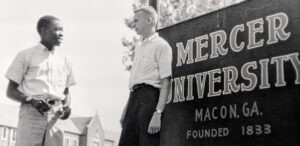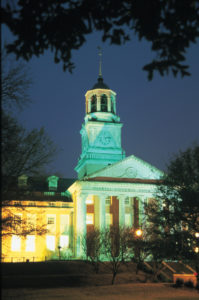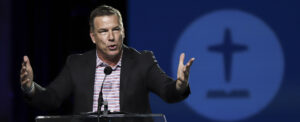Editor’s note: Bill Leonard served as professor of church history and chair of the Religion Department at Samford University from January 1992 to June 1996.
In his 1995 book, The Stem of Jesse: The Costs of Community at a 1960s Southern School, the inimitable Will Campbell describes a scene at the Tattnall Square Baptist Church, on the campus of Mercer University, when Nigerian Sam Oni tried to worship there on Sept. 25, 1966.

Bill Leonard
Oni, converted to Christ through the witness of Southern Baptist missionaries, was the first Black student admitted to the Baptist-related, segregated school three years earlier. His matriculation, first resisted by university officials, finally occurred after the admissions officer and members of the religion department told them: You can’t evangelize Africans “on the mission field” and then refuse them entrance into a Baptist school without violating the very gospel you claim to believe and declare.
When Sam Oni showed up at the church door that Sunday, the 2,000-member church was prepared, having voted 289 to 109 that July to “close their door to Blacks.” Campbell recounts what happened next: “’You can’t go in there,’ a deacon, standing on the churchhouse doorstep, said as Oni approached. ‘You know our position,’ said another deacon standing beside him. ‘We’re with the majority of the church.’”

Sam Oni with an unnamed students at Mercer University. Oni was the first Black student admitted to the all-white Baptist school.
Campbell reports Oni’s response: “Why do you treat me in this fashion? I am your brother. My people have heard the gospel from the lips of your people. Did they deceive?”
Someone in the group answered: “You’re not going in there! Not in our church! Go away!”
The deacons called the cops, already stationed nearby, and Sam Oni was taken into custody, but not before he could hear the robed choir singing the processional hymn,
Where cross the crowded ways of life,
Where sound the cries of race and clan,
Above the noise of selfish strife,
We hear thy voice, O Son of man!
Will Campbell comments that on that infamous Sunday, “Three hundred ninety-eight guardians of the tattered coat of Christ would sit at Sunday dinner with only them, and their God or gods, knowing for sure what they had done on a morning they called ‘the Lord’s Day.’”
I was privileged to meet Sam Oni several years ago when he attended a racial reconciliation conference at Mercer where I was a speaker. It was a profound experience.
“We confess our faith, declare our dogmas, unleash our gospel rhetoric but wind up misusing that gospel to undergird our prejudices.”
Looking back on those events now, few of us would deny that the actions of the Tattnall Square congregation were inconsistent with the gospel they proclaimed and sang. It is a danger for all of us. We confess our faith, declare our dogmas, unleash our gospel rhetoric but wind up misusing that gospel to undergird our prejudices (as in the case of the Tattnall Square folks), or we fail to apply our gospel boundaries with consistency (as appears to be the case at Samford University these days).

Samford University
Shortly after the fall 2022 semester began, it became known that Samford had chosen to “disinvite” Episcopal and Presbyterian (PCUSA) ministers from participation in Ministry Expo, restricting their presence on campus. The reason? The two denominations are “open and affirming” to LGBTQ persons and recognize same-sex marriages.
A spokesperson for the Episcopal Diocese of Alabama reported: “We are not allowed to do ministry on campus currently. We learned that Samford is revising and revamping some of its policies related to guest ministries. We have expressed to Samford that we are very interested in continuing this over 30-year relationship we’ve had with the university.”
Samford’s vice president for student affairs issued a letter to the “campus community” explaining the doctrinal reasons for such actions, noting:
Throughout its history, the university has consistently subscribed to and practiced biblically orthodox beliefs. While we embrace many forms of diversity on campus and genuinely love each student, the university has a responsibility to formally partner with ministry organizations that share our beliefs. Current ministry partners include a Roman Catholic student organization, Reformed University Fellowship, Campus Outreach, Fellowship of Christian Athletes, and many local churches, including Baptist, Methodist, Presbyterian, Episcopalian, Roman Catholic and other non-denominational traditions.
“Given Samford’s ethical sensibilities, it is the ‘Baptist’ reference that seems particularly problematic.”
Given Samford’s ethical sensibilities, it is the “Baptist” reference that seems particularly problematic. At this moment in time, the Southern Baptist Convention and the Alabama Baptist Convention which partners with it confront long-ignored epidemics of sexual abuse committed by Baptist ministers across the denomination, ministers often protected by SBC leaders, clergy and laity.
This June, messengers to the annual meeting of the denomination approved the report of an independent investigation of the SBC Executive Committee prepared by Guidepost Solutions, an agency hired to examine the issue.
It begins: “For almost two decades, survivors of abuse and other concerned Southern Baptists have been contacting the Southern Baptist Convention Executive Committee to report child molesters and other abusers who were in the pulpit or employed as church staff. They made phone calls, mailed letters, sent emails, appeared at SBC and EC meetings, held rallies, and contacted the press … only to be met, time and time again, with resistance, stonewalling, and even outright hostility from some within the EC.”
The report continued: “While stories of abuse were minimized, and survivors were ignored or even vilified, revelations came to light in recent years that some senior SBC leaders had protected or even supported abusers.”

Bruce Frank, chair of the SBC Sexual Abuse Task Force, adddresses the SBC annual meeting,
The report documented that “a 2007 proposal for an SBC database of accused molesters was rejected in 2008 based on church autonomy, even though SBC outside counsel had submitted a memo … discussing how it could be accomplished consistent with polity; A 2014 proposal for the SBC to hold a sexual abuse education conference was opposed … delayed, and ultimately did not occur.”
The report concluded: “Despite collecting these reports for more than 10 years, there is no indication that … (anyone) took any action to ensure that the accused ministers were no longer in positions of power at SBC churches. The most recent list prepared by the EC staff member contained the names of 703 abusers, with 409 believed to be SBC-affiliated at some point in time.”
Hence the dilemma faced by Samford University. Referencing the orthodoxy of its religio-ethical standards, the school determined that representatives of two national denominations would be restricted from campus because, according to ministry guidelines, they did not “have and observe a statement of faith and theological perspective that is consistent with the Mission, Vision and Core Values of Samford,” specifically related, in the university president’s words, to “scriptural beliefs” regarding “the traditional view of sexuality and marriage.”
“In consistently applying its ‘scriptural beliefs’ to all ministry partners, might Samford at least impose a moratorium on SBC representatives until the denomination ‘shows forth fruits of repentance’?”
While the SBC maintains a faith statement and theological perspective consistent with Samford’s, its behavior at the highest levels of denominational leadership in overlooking sexual abuse, protecting abusers and vilifying victims is surely not compatible with Samford’s “Mission, Vision and Core Values.” If so, why do representatives of that entire denomination remain “formal ministry partners” with the university?
While the SBC has finally owned up to its failure to deal with sexually abusive ministers and take seriously the testimonies of the abused, it has only begun that process. It remains to be seen if and how the denomination’s Executive Committee will implement the redemptive process approved by messengers to the SBC gathering last June.
In consistently applying its “scriptural beliefs” to all ministry partners, might Samford at least impose a moratorium on SBC representatives until the denomination “shows forth fruits of repentance” for 20 years of moral ineptitude?
It is a danger for all of us. Consistently living up to the gospel’s ethical imperatives is difficult enough for us as individuals. But when persons or institutions attempt to apply those mandates to others, we’d best have our ethical ducks and doctrines in order and apply them with all the consistency we can muster.
Where cross the crowded ways of life and gospel, ethical consistency is ever elusive.
Bill Leonard is founding dean and the James and Marilyn Dunn professor of Baptist studies and church history emeritus at Wake Forest University School of Divinity in Winston-Salem, N.C. He is the author or editor of 25 books. A native Texan, he lives in Winston-Salem with his wife, Candyce, and their daughter, Stephanie.
Related articles:
Samford University excludes Presbyterians and Episcopalians
Samford, how long will you remain silent? | Opinion by Mark Wingfield
I’m now banned from ministering at a place I love | Opinion by Rich Havard
We are hurt by Samford’s exclusion | Opinion by Erica Cooper
100 clergy who are Samford grads urge president to reverse exclusionary policy
Samford, how long will you remain silent? | Opinion by Mark Wingfield
Samford students organize silent protest over LGBTQ discrimination


